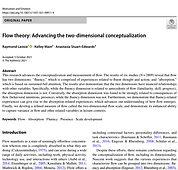Peer Reviewed Publications

Group flow: A theory of group member interactions in the moment and over time.
We adopt a process perspective to unpack the temporal dynamics of group flow—a state characterized by full, seemingly effortless attention, shared positive emotional arousal, and additive, swift contributions—to theorize the momentary interactions through which group flow emerges. In doing so, we highlight the importance of the timing of contributions, how contributions relate to each other, and group momentum.

What happens when flow ends? How and why your creativity is limited after a flow experience.
Flow is touted for the enjoyment it provides and for its relationship with concurrent task performance. But what happens when flow ends, and you move on to your next task? Our research demonstrates that there is a cost to being in flow in this regard. Specifically, the findings of three studies with 746 participants demonstrate that a person who just experienced flow carries forward a figurative tunnel vision which limits their creativity.

Smartphone use, flow and wellbeing: A case of Jekyll and Hyde
This research advances our understanding of the nuanced relationship between smartphone use and wellbeing. Two studies reveal new ways in which smartphone use can be positively related to wellbeing and they also explain why those same smartphone functions can be harmful for other users. Our research reveals that flow is the underlying mechanism driving the nuanced relationship between smartphone use and wellbeing.

Optimizing Product Trials by Eliciting Flow States:
The Enabling Roles of Curiosity, Openness, and Information Valence
Product trials are an effective way to influence consumer attitudes. While research has established several factors that influence whether consumers will try a product or not, it is less understood how marketers can optimize the trial experience itself. This research explores flow as an optimal state and the factors that give rise to it during a product trail.

Flow Theory: Advancing the Two-Dimensional Conceptualization
This research advances the conceptualization and measurement of fow. The results of six studies (N=2809) reveal that flow has two dimensions: “fuency,” which is comprised of experiences related to fuent thought and action; and “absorption,” which is based on sustained full attention. The results also demonstrate that the two dimensions have nuanced relationships with other variables.

Employee Reactions to Preservice Tips and Compliments
Preservice tips are becoming increasingly common in the marketplace. While prior research has investigated how the practice of preservice tipping is perceived by customers, how preservice tipping impacts the perceptions and behaviors of employees remains unexplored. Through a series of four studies, our research compares the effectiveness of tips—a financial incentive, with compliments—a nonfinancial incentive.

Virtual Experience, Real Consequences: The Potential Negative Emotional Consequences of Virtual Reality Gameplay
As virtual reality (VR) technology enters mainstream markets, it is imperative that we understand its potential impacts on users, both positive and negative. In the present paper, we build on the extant literature’s focus on the physical side effects of VR gameplay by focusing on VR’s potential to intensify users’ experiences of negative emotions.

The Virtual Takeover: The Influence of Virtual Reality on Consumption
Looking to current trends, this paper explores the influence of Virtual Reality (VR) on consumption. Specifically, we focus on the influence that VR has on consumer spending by suggesting that identities created in VR will influence consumption behaviour in the real world. While other forms of technology allow consumers to create alternative identities, we suggest that the unique aspects of VR, bolstered by forthcoming advances, will make identities created in VR relatively more self‐important and more salient in real world consumption.

Consumer Microflow Experiences
This research explores relatively short, low‐intensity flow states, called microflow and demonstrates that they differ from their longer, more complex deepflow variants with regards to antecedents. As an advancement to flow theory, we demonstrate that the ideal condition to elicit microflow is when skills are slightly higher than the difficulty of the task. Importantly, despite being relatively shorter, microflow experiences still have a strong positive influence on consumer attitudes.

When Losing Money and Time Feels Good: The Paradoxical Role of Flow in Gambling
Despite being well-known for its positive consequences, the psychological state of flow has raised some concerns. In this research, we advanced our understanding of the relationships that flow has in the context of online gambling. Across two studies, in which participants played blackjack and slots, we demonstrated that flow is associated with an increase in the amount of time spent gambling. Flow is also related to an increase in the amount of money spent.